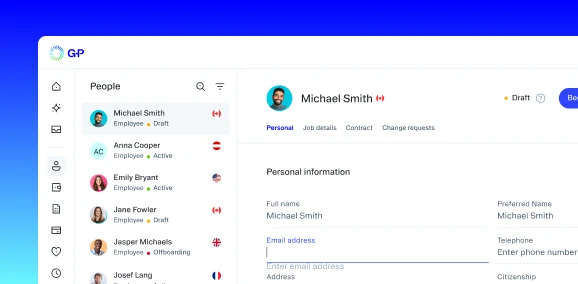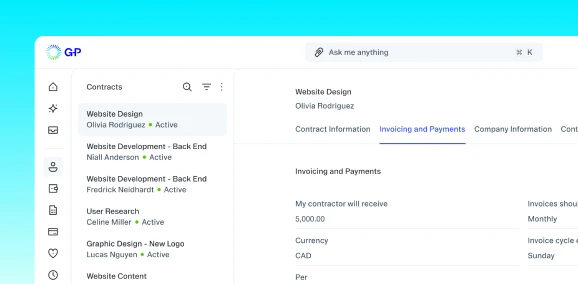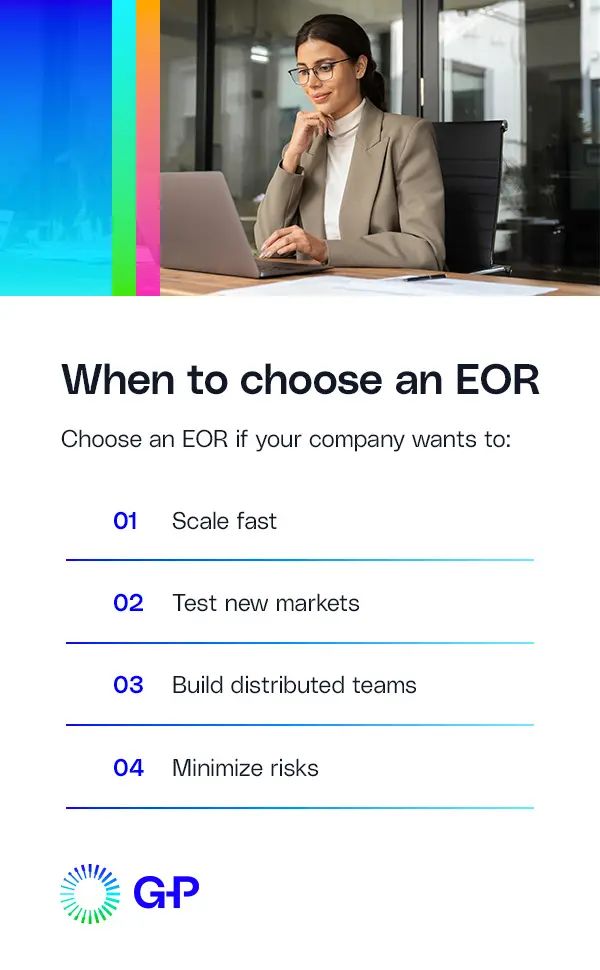It's a common misconception that professional employer organizations (PEOs) and employers of record (EORs) are the same thing. While EORs and PEOs both streamline employee hiring, payroll, and other HR functions, these models have different scopes and structures.
If you're not sure which approach is best for your business, this PEO vs. EOR guide will help you decide.
What is an EOR?
An EOR is a third-party organization that acts as the legal employer on behalf of a company.
Partnering with an employer of record allows you to hire globally, without the complexity and expense of establishing an in-country subsidiary. Instead, the EOR has local subsidiaries around the world and hires employees for you.
The EOR manages compliance with local labor laws and streamlines onboarding, payroll, taxes, and benefits administration.
While the EOR is the legal employer, your company directs the employee's daily work. This includes choosing:
-
What total remuneration package to offer
-
How to assign and schedule work tasks
-
Who to promote and terminate
Some EORs have a fixed fee per employee, while others charge based on the location and length of the contract.
What is a PEO?
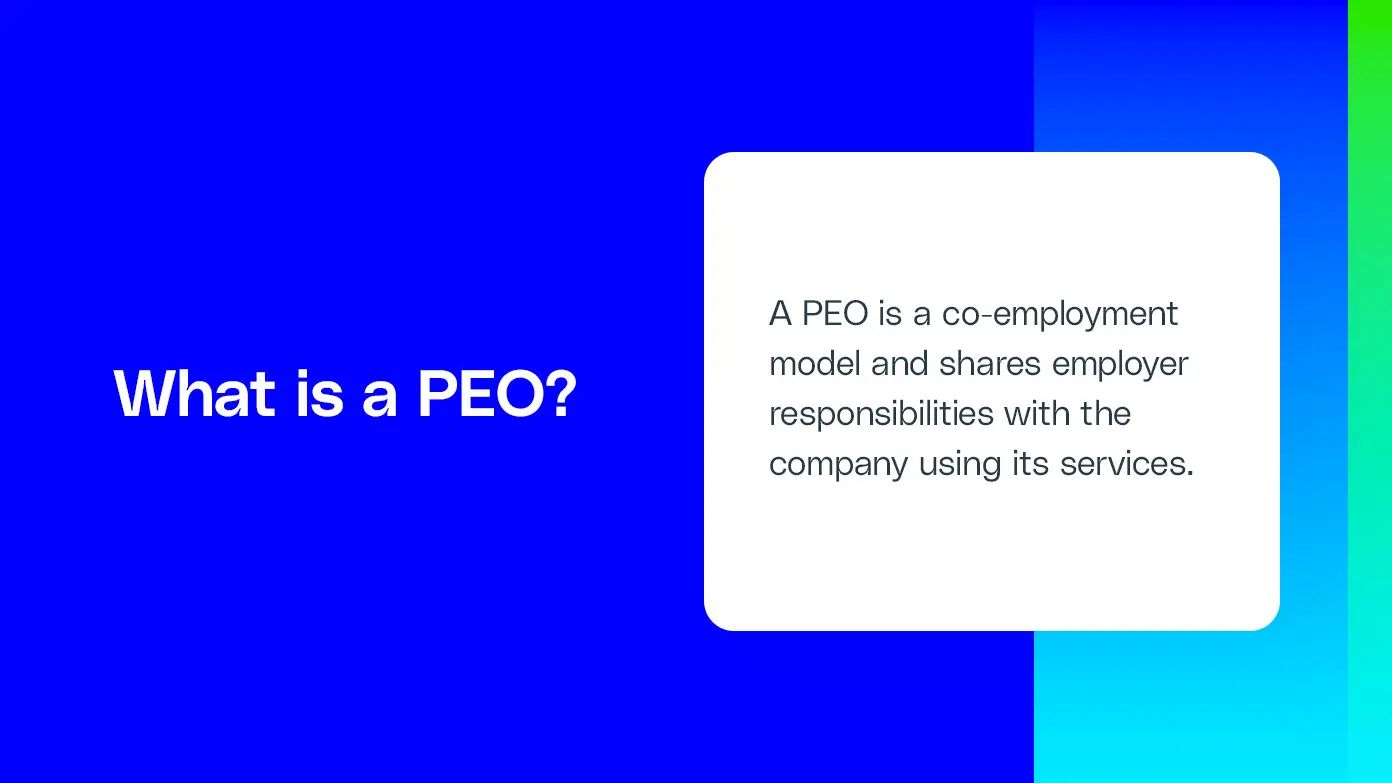
A PEO streamlines HR services, including payroll, tax, benefits administration, and compliance support. The PEO shares employer responsibilities with the company using its services. Companies must have a legal entity to enter a co-employment relationship with a PEO. PEOs usually work with small to medium-sized companies hiring within the U.S.
There are over 500 PEOs in the U.S. serving more than 200,000 customers. Most PEOs charge a flat fee for each employee per month or a percentage of the customer's total payroll.
What's the difference between employer of record vs PEO?
While PEOs and EORs perform similar HR functions, there are six key differences between PEOs and EORs.
1. Direct employer vs. co-employer
The main difference between EORs vs PEOs is that an EOR acts as the sole legal employer. Employers of record handle compliance with labor laws and regulations. PEOs rely on a co-employment model. They share employment responsibilities, such as payroll and benefits coordination, but the customer company remains the legal employer.
An EOR provides and enters into locally compliant employment contracts with the employees you want to hire and is responsible for compliance with relevant employment laws and regulations. With a PEO, your company's name is on the employment contract, making you responsible for legal compliance, employee-related liabilities, and workplace obligations.
PEOs handle administrative tasks, but your company retains legal liability for employment law violations. Although EORs and PEOs both streamline HR workflows, an EOR mitigates risk and manages compliance with local labor laws and employer obligations.
2. Strategic guidance vs. coordination
Reputable EORs have vast expertise in employment practices, labor regulations, and cultural nuances of the regions where they operate. They share these insights to help companies succeed in new markets. A best-in-class EOR provider can support you with:
-
Employee benefits expectations in your target locations
-
Best practices for successful employment relationships in each country
-
Employer burden rates across countries
PEOs don't offer this level of strategic workforce guidance.
3. Entity required vs. not required
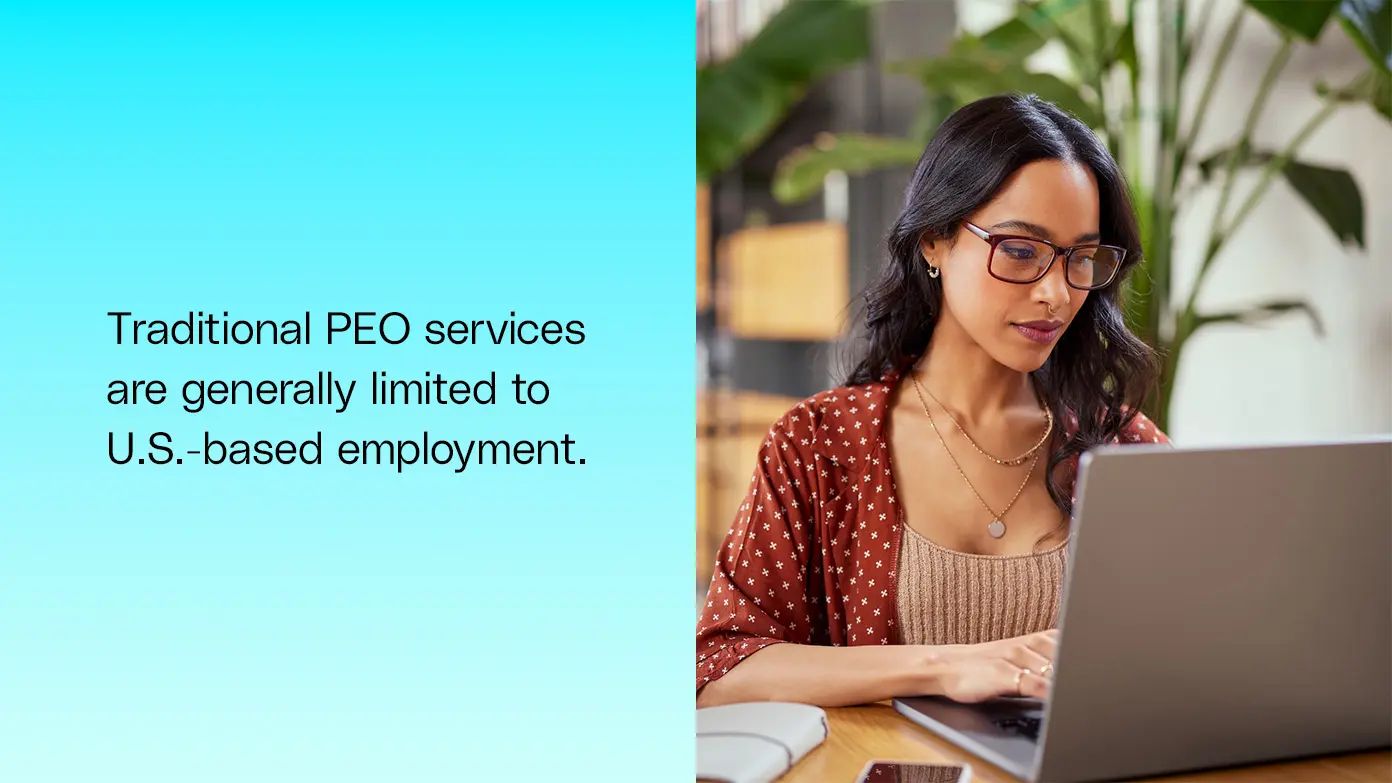
PEOs lack a key component of the EOR value proposition — allowing companies to hire in new countries without the time and cost of establishing a local entity. The PEO co-employment model requires companies to have an entity and share employer responsibilities.
While some providers position themselves as global PEOs, traditional PEO services are generally limited to U.S.-based employment. In contrast, an EOR can legally support hiring in multiple countries.
4. Global compliance vs. domestic guidance
EORs and PEOs differ in scope and compliance responsibilities. Reputable EORs stay on top of changing regulations regarding hiring, payroll, benefits, and other HR areas. As the legal employer, an EOR will do all the admin work to fulfill these HR functions and meet compliance standards.
PEOs can help with certain compliance requirements within the U.S., including Occupational Safety and Health Administration (OSHA) and Consolidated Omnibus Budget Reconciliation Act (COBRA) adherence. However, they don't support global scaling or assume legal liability for compliance. For full HR compliance in global markets, you need an EOR, in-house expertise about each country's legal landscape, or a substantial budget for ongoing external legal counsel.
5. Comprehensive vs. partial payment services
Streamlining payroll and benefits is one of the top reasons companies work with an EOR or PEO. As the legal employer, an EOR is responsible for all aspects of global employment and compensation, including payroll processing, paying salaries, deductions, tax withholding, bonuses, and benefits administration.
PEOs can help with payroll processing and tax reporting, and they can provide access to healthcare, workers' compensation, and other benefits. If the PEO pays employee salaries in the U.S., it may incur tax obligations under the IRS third-party payer regulations.
It's easy to lose track of who handles what in co-employment setups. So, it's important that both the PEO and the company clearly understand their responsibilities.
6. Total flexibility vs. minimum employees
Some PEOs have minimum employee requirements. They often partner with companies with at least five employees. EORs don't impose these restrictions. This makes EORs ideal for testing new markets or hiring a distributed workforce while having unlimited agility to scale up or down.
Should you choose an EOR or a PEO?
Whether your company should choose an EOR or a PEO depends on your corporate structure and expansion plans.
When to choose an EOR
An EOR is ideal for companies that want to hire a global team without establishing local entities. Choose an EOR if you want to:
-
Scale fast: An EOR can give you access to global talent pools in minutes, not months. This allows your company to save on expenses, stay ahead of the competition, and seize opportunities as they arise.
-
Test new markets: If you're interested in a new country but aren't ready to commit to a permanent presence, an EOR is the best way to explore the market. You can hire a small local team and assess the market without investing in your own local entity.
-
Build distributed teams: With an EOR, you don't have to limit your hiring efforts to your home base. You can hire the best talent anywhere in the world and increase productivity with follow-the-sun workflows.
-
Minimize risks: EORs provide comprehensive employment services, stay on top of regulatory changes, and ensure compliance with local employment laws.
When to consider a PEO
An EOR has a broader reach and scope than a PEO. But a PEO may be a good fit for companies that have an existing entity and want to streamline HR functions in the U.S.
Since PEO customers remain the legal employer, they have more direct control over every aspect of employment management. This direct control comes with more responsibilities and liability for employment law issues.
If your company's HR and legal team can manage compliance risks and you plan on sticking to regions where you already have an established legal presence, a PEO may work for you.
Why more businesses are choosing EORs for global hiring
An EOR is the best option for global hiring. However, the depth of expertise and standards of service you’ll experience depend on the EOR provider. Partner with G-P™ and work with the industry's top EOR.
As the recognized leader in global employment, G-P helps companies of all sizes hire, onboard, and manage global teams in 180+ countries, regardless of entity status. Our AI-powered global employment products and EOR solutions are backed by the largest team of in-country HR, legal, and compliance experts to streamline and simplify the entire global employment lifecycle.
Hire globally with G-P
With a deep understanding of global employment laws and a presence in 180+ countries, G-P offers the best EOR solutions for businesses of all sizes.
Contact us today to see how the G-P EOR can help you hire anywhere — without the complexity of establishing local entities.
